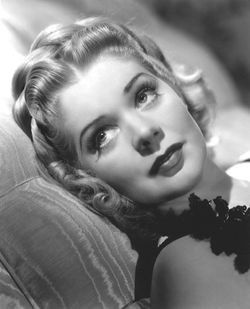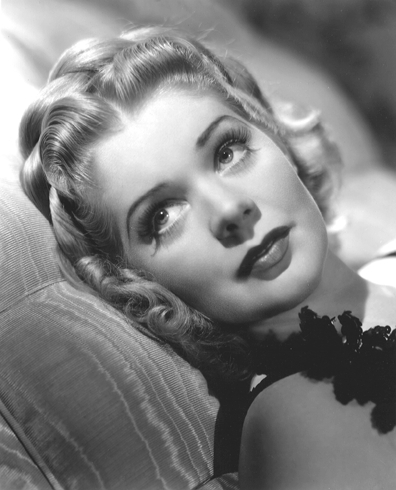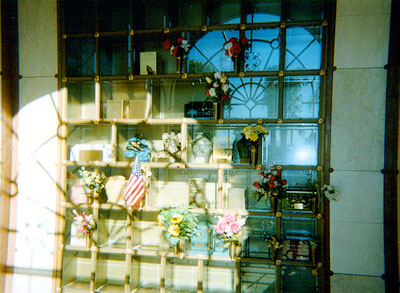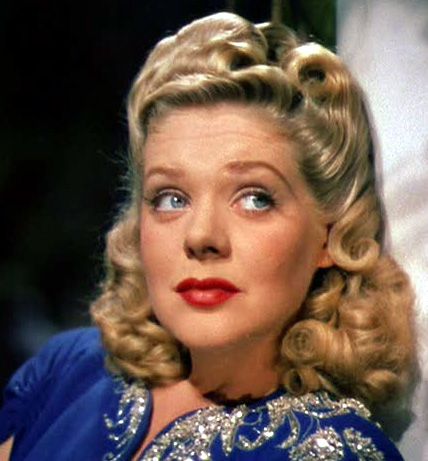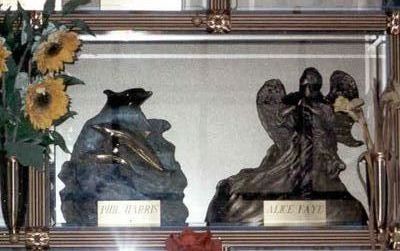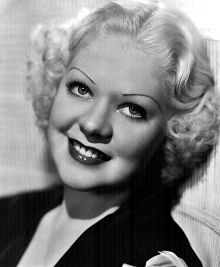Actress, Singer. Born Alice Jeanne Leppert and raised in New York City's "Hell's Kitchen," Alice Faye quit school at 14 to become a chorus girl, lying about her age in order to get the audition. She danced in the famous "George White's Scandals" revues. Not long after that she was discovered by Rudy Vallee, who hired her to sing with his band. Vallee went to Hollywood to star in Fox's 1934 film version of George White's Scandals and Faye, who was slated to sing one song in the film, became leading lady when co-star Lilian Harvey walked off the picture. Her success in the film landed her a contract at Fox. Initially, the studio saw her as a Jean Harlow clone and dyed her hair platinum, plucked her eyebrows and dressed her to show off her figure. She played "tough chick" roles in "She Learned About Sailors," "Now I'll Tell" (both 1934), "365 Nights In Hollywood," "George White's Scandals of 1935," "Every Night at Eight," "Music Is Music" and "King of Burlesque" (all in 1935). In 1936, producer Darryl F. Zanuck decided to soften Faye's public image. Beginning with "Sing, Baby, Sing," (1936) the public saw a more endearing Faye, with her natural hair color and eyebrows. Her appearances in "On the Avenue", "You Can't Have Everything", "You're a Sweetheart", "Wake Up and Live" (all 1937) and "Sally, Irene and Mary" (1938), along with her performances in two 1936 Shirley Temple pictures, "Poor Little Rich Girl" and "Stowaway" firmly established Faye as one of the screen's top musical stars. Faye's best dramatic role was in the historical drama "In Old Chicago" (1938), after which she and co-star Tyrone Power were re-teamed for the Irving Berlin musical "Alexander's Ragtime Band" (1938) and "Rose of Washington Square" (1939). In the 1940s, she appeared with Don Ameche in "Hollywood Cavalcade," "Lillian Russell" and "That Night in Rio" and co-starred with John Payne in "Tin Pan Alley" (with Betty Grable playing her sister), "Weekend in Havana," "The Great American Broadcast" and "Hello Frisco, Hello," in which Alice introduced the Oscar-winning song "You'll Never Know," the song most identified with her. Faye had married singer-bandleader Phil Harris in 1941 and took time off to have her second child after completing Busby Berkeley's "The Gang's All Here" (1943). In late 1944 she returned to Fox and was assigned to "Fallen Angel" (1945), a drama co-starring Dana Andrews and Linda Darnell. Although the film was supposed to be a vehicle for Faye, many of her scenes were deleted to make room for Darnell, who was being groomed by Fox studio chief Darryl F. Zanuck. After seeing the picture in a studio projection room, Faye drove off the lot and didn't return for 16 years. Faye stayed home to raise her two daughters, but stayed in show business by co-starring with her husband on a weekly radio show. She made occasional TV appearances, before accepting a role as the mother in the1962 Fox remake of "State Fair." She made a major return to acting in a very successful national tour of the musical play "Good News," co-starring John Payne and Stubby Kaye. During the 1980's Faye signed with Pfizer Pharmaceuticals as a "Good Health Ambassador" and made personal appearances all over the country promoting the virtues of physical fitness for senior citizens.
Actress, Singer. Born Alice Jeanne Leppert and raised in New York City's "Hell's Kitchen," Alice Faye quit school at 14 to become a chorus girl, lying about her age in order to get the audition. She danced in the famous "George White's Scandals" revues. Not long after that she was discovered by Rudy Vallee, who hired her to sing with his band. Vallee went to Hollywood to star in Fox's 1934 film version of George White's Scandals and Faye, who was slated to sing one song in the film, became leading lady when co-star Lilian Harvey walked off the picture. Her success in the film landed her a contract at Fox. Initially, the studio saw her as a Jean Harlow clone and dyed her hair platinum, plucked her eyebrows and dressed her to show off her figure. She played "tough chick" roles in "She Learned About Sailors," "Now I'll Tell" (both 1934), "365 Nights In Hollywood," "George White's Scandals of 1935," "Every Night at Eight," "Music Is Music" and "King of Burlesque" (all in 1935). In 1936, producer Darryl F. Zanuck decided to soften Faye's public image. Beginning with "Sing, Baby, Sing," (1936) the public saw a more endearing Faye, with her natural hair color and eyebrows. Her appearances in "On the Avenue", "You Can't Have Everything", "You're a Sweetheart", "Wake Up and Live" (all 1937) and "Sally, Irene and Mary" (1938), along with her performances in two 1936 Shirley Temple pictures, "Poor Little Rich Girl" and "Stowaway" firmly established Faye as one of the screen's top musical stars. Faye's best dramatic role was in the historical drama "In Old Chicago" (1938), after which she and co-star Tyrone Power were re-teamed for the Irving Berlin musical "Alexander's Ragtime Band" (1938) and "Rose of Washington Square" (1939). In the 1940s, she appeared with Don Ameche in "Hollywood Cavalcade," "Lillian Russell" and "That Night in Rio" and co-starred with John Payne in "Tin Pan Alley" (with Betty Grable playing her sister), "Weekend in Havana," "The Great American Broadcast" and "Hello Frisco, Hello," in which Alice introduced the Oscar-winning song "You'll Never Know," the song most identified with her. Faye had married singer-bandleader Phil Harris in 1941 and took time off to have her second child after completing Busby Berkeley's "The Gang's All Here" (1943). In late 1944 she returned to Fox and was assigned to "Fallen Angel" (1945), a drama co-starring Dana Andrews and Linda Darnell. Although the film was supposed to be a vehicle for Faye, many of her scenes were deleted to make room for Darnell, who was being groomed by Fox studio chief Darryl F. Zanuck. After seeing the picture in a studio projection room, Faye drove off the lot and didn't return for 16 years. Faye stayed home to raise her two daughters, but stayed in show business by co-starring with her husband on a weekly radio show. She made occasional TV appearances, before accepting a role as the mother in the1962 Fox remake of "State Fair." She made a major return to acting in a very successful national tour of the musical play "Good News," co-starring John Payne and Stubby Kaye. During the 1980's Faye signed with Pfizer Pharmaceuticals as a "Good Health Ambassador" and made personal appearances all over the country promoting the virtues of physical fitness for senior citizens.
Bio by: Craig Johnson
Family Members
Advertisement
